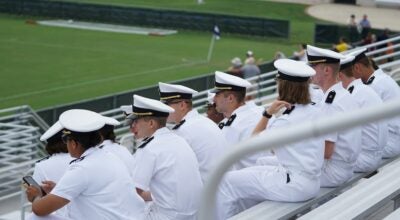2nd Chance MS continues to assist those in need
Published 5:22 pm Saturday, June 17, 2017
By Reid Posey
news@oxfordeagle.com
A few years ago, Dickie Scruggs listened to a radio program on Mississippi Public Broadcasting that impacted not only his life, but ultimately the lives of countless others across the state of Mississippi.
As he sat and listened to Colleen Hartfield, an employee at Hinds Community College, speak about the need for wraparound support for lower-income adults seeking education, he drew on his experiences in federal prison helping fellow inmates work toward their equivalency degrees and saw an opportunity to make a true difference in people’s lives.
What started as a simple idea to help lower-income individuals achieve their educational goals has blossomed into the Oxford-based non-profit 2nd Chance MS. The organization works with all 15 community colleges across the state to raise awareness and funds for adult education and workforce training throughout Mississippi.
“He understood the need for and the benefits of someone going back and getting this education,” said 2nd Chance MS Executive Director Zach Scruggs, who joined his father Dickie at the organization in April 2016.
The most recent development at 2nd Chance MS is their acceptance of a grant from the Mississippi Women’s Foundation to support a program at Coahoma Community College that will train participants to be Certified Nursing Assistants and Emergency Medical Technicians after helping them obtain high school equivalency degrees.
Along with the Exchange Club Family Center, 2nd Chance MS was hand-selected for a grant by the Women’s Foundation for being an organization making a clear impact on the lives of women in the state of Mississippi.
The program at Coahoma works similarly to most of 2nd Chance MS’ other efforts around the state, as they help lower-income adults utilize the opportunities presented by Mississippi’s excellent community college system to receive training in areas like nursing, welding, or commercial truck driving.
“What we’ve done with Coahoma is basically develop a program that takes a group of people that don’t have their high school diplomas or any kind of work skills and provide the necessary support so they can get both within a reasonable period of time,” Zach Scruggs said.
Comparing the new program to similar programs already in place at Itawamba Community College and Northeast Community College, Zach Scruggs said that the goal is to get the participants their equivalency degrees and the necessary work skills in just six months.
Zach Scruggs said that 2nd Chance MS relies on the colleges to advise the organization about what specific areas of need they have, and that Coahoma voiced a clear need for nurses.
“What they explained to us at Coahoma is that there are a lot of good people who want to be nurses, have the aptitude and the attitude, but right now don’t have the necessary high school equivalency to get into the nursing program,” Zach Scruggs said.
Each semester, 20 women will be accepted into the program. In addition to free tuition, they will receive a $250 acceptance bonus, and when they graduate, they will receive another $250. Each week they successfully complete during the program, they will receive $20 for small expenditures like gas money or food.
This type of financial support is indicative of the kind of wraparound financial support 2nd Chance MS provides to lower-income students. Even though $20 per week might not seem like much, Zach Scruggs said that community colleges have told him that it has a major impact on the students.
By helping these students overcome these financial burdens, 2nd Chance MS is able to impact not only the students’ lives, but also the well-being of the state of Mississippi, as more people become qualified to enter the workforce and serve in their respective fields.
“This is a segment of our population that has kind of fallen through the cracks, but we think with the proper incentives and support, they can get through,” Zach Scruggs said. “We get 20 nurses that were otherwise not there this semester, and then 20 next semester, and the program’s a success.”





